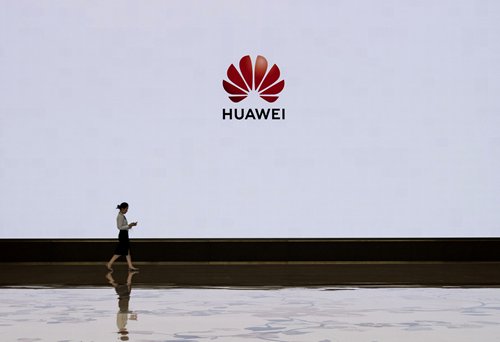HOME >> BUSINESS
‘American Trap’ offers trade-war lessons
By Yang Kunyi and Li Xuanmin Source:Global Times Published: 2019/5/28 21:38:40

A member of Huawei's reception staff walks in front of a large screen displaying the logo in the foyer of a building used for high-profile visits. Photo: VCG
Le Piège Américain, or The American Trap, a book on an American takeover of a French power company in 2015, has become a hit with Chinese business owners since it was spotted on the desk of Huawei founder and CEO Ren Zhengfei, and it has been hailed as a must-read for business leaders who want to expand globally.
In a recent interview with Ren at Huawei's headquarters in Shenzhen, South China's Guangdong Province, copies of The American Trap were everywhere. A Huawei employee told the Global Times that it is a book "every Huawei employee is encouraged to read."
"I have saved the e-book to my mobile phone, and I read it whenever I have time," a 50-something executive at a Guangdong-based trading company surnamed Wang told the Global Times. He started reading the book this week.
He said that most of his peers in the trading sector are reading the book, in order to "learn the US [tricks in cracking down on foreign competitors] and getting prepared."
The book, by Frederic Pierucci and Matthieu Aron, tells how Alstom, a French power and transportation conglomerate was partly taken over by US company General Electric. The process not only involved questionable legal conduct but also raised uncomfortable questions that can shed light on today's international trade environment and what Huawei, among many other companies, faces.
In Alstom's case, the French power and transportation conglomerate was subject to US extraterritorial action, which gives the US the power to sue companies outside the US and take legal action against their executives in the US. As a result, many executives and employees are fearful of the extremely long arms of American law enforcement.
For many entrepreneurs in China, the fear is not unwarranted. As seen in the cases of Alstom and Huawei, it is dubious whether this type of extraterritorial action has turned the US Department of Justice into a mere law enforcer of Washington's economic ambitions, launching illegitimate and extrajudicial crackdowns on any company it deems threatening to its global hegemony.
A CEO at a Chinese artificial intelligence (AI) company, who has just read the book, told the Global Times Tuesday that the book made him realize that the US is willing to "do anything, including measures taken under the table and sneaky tactics" to maintain its dominance in all sectors - technology, finance and the military.
"To read the book is to learn from the past and form an understanding of how to deal with similar cases. I'm in a 'sensitive' high-tech industry that is being watched closely by the US government," the CEO said. "If we want to become a leader in AI, how could I avoid confrontations with US policymakers?
"This is a case of hegemony and the US tradition of long-arm jurisdiction. The US will never allow others to challenge its position. US policymakers now even nakedly revise laws to contain the rise of technology rivals. In the past, they tried to hide this."
The CEO said he will not travel to the US this year, after being shocked by Huawei executive Meng Wanzhou's case and US accusations against her. In the past, he often travelled to the US for technology cooperation and communication, such as participating in the annual Consumer Electronics Show in Las Vegas, the world's largest trade event for consumer technology.
Posted in: COMPANIES